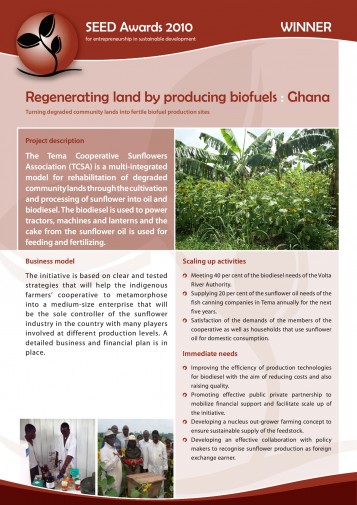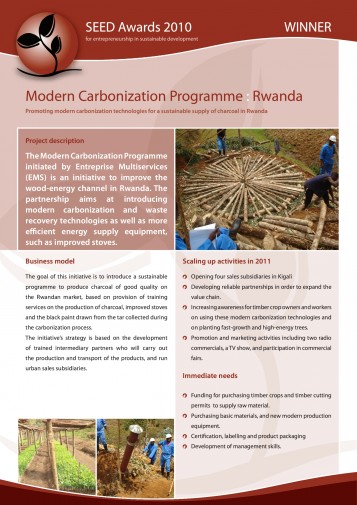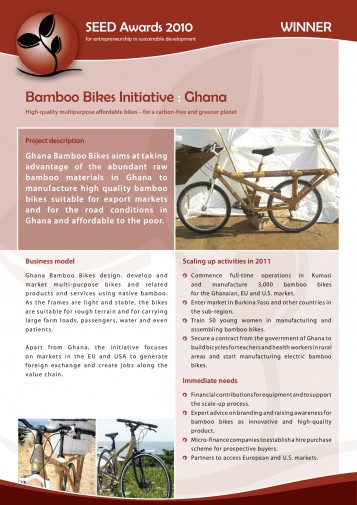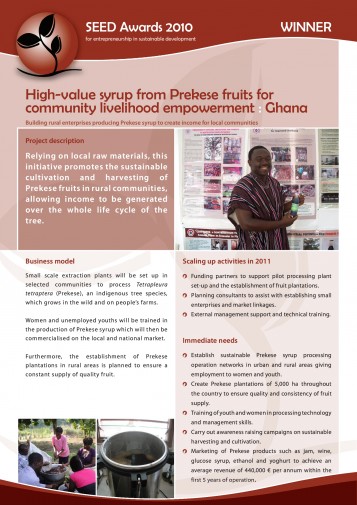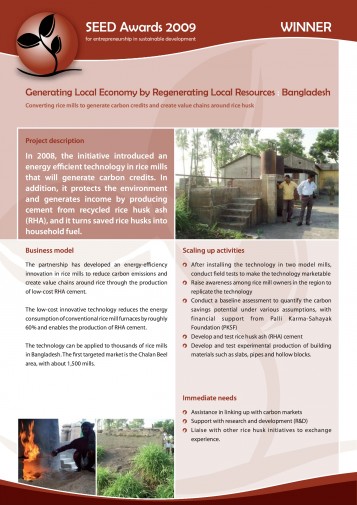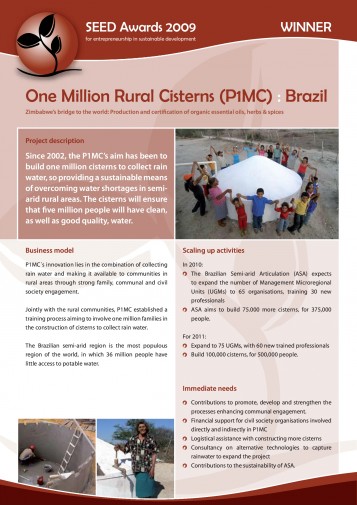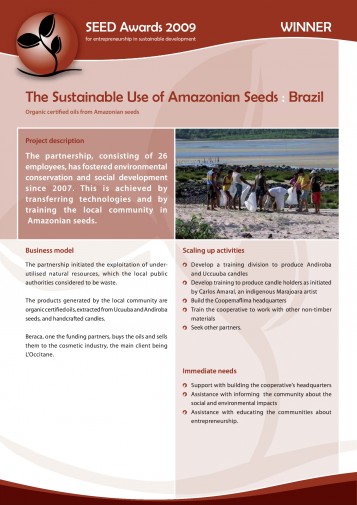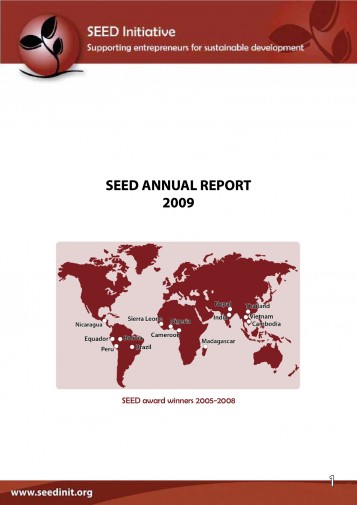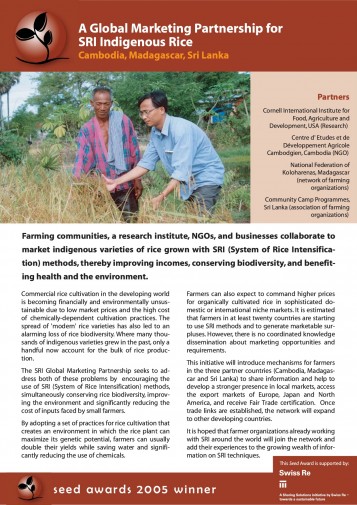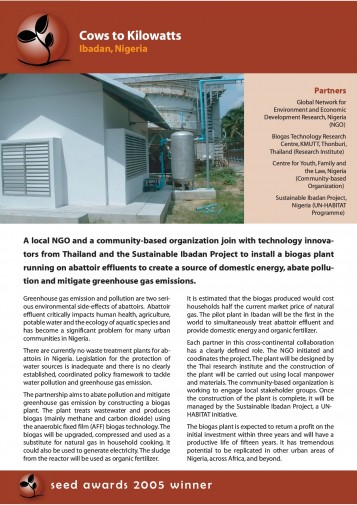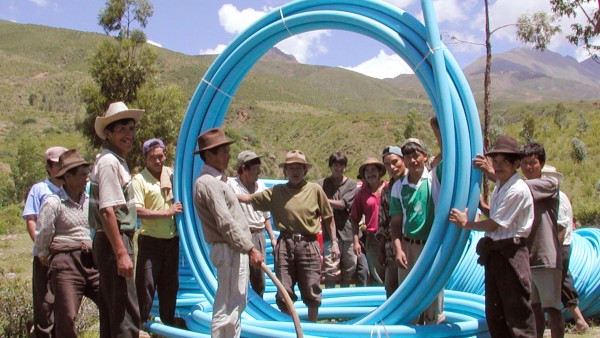Enterprise Brief: Biofuel Production in Promoting Sustainable Land Management
Published: 24 August 2010
The Tema Cooperative Sunflowers Association (TCSA) is a multi-integrated model for rehabilitation of degraded community lands through the cultivation and processing of sunflower into oil and biodiesel. The biodiesel is used to power tractors, machines and lanterns and the cake from the sunflower oil is used for feeding and fertilizing. Read more
SDGs:







Enterprise Brief: Efficient Charcoal Production and Smoke Recycling
Published: 24 August 2010
The Modern Carbonization Programme initiated by Enterprise Multiservices (EMS) is an initiative to improve the wood-energy channel in Rwanda. The partnership aims at introducing modern carbonization and waste recovery technologies as well as more efficient energy supply equipment, such as improved stoves. Read more
SDGs:





Enterprise Brief: Ghana Bamboo Bikes Initiative
Published: 24 August 2010
Ghana Bamboo Bikes aims at taking advantage of the abundant raw bamboo materials in Ghana to manufacture high quality bamboo bikes suitable for export markets and for the road conditions in Ghana and affordable to the poor. Read more
SDGs:







Enterprise Profile: High-value Syrup from 'Prekese' Fruits for Community Livelihood Empowerment
Published: 24 August 2010
Relying on local raw materials, this initiative promotes the sustainable cultivation and harvesting of Prekese fruits in rural communities, allowing income to be generated over the whole life cycle of the tree. Read more
SDGs:







SEED Annual Report 2010
Published: 23 August 2010
The SEED Annual Report 2010 covers SEED’s progress and developments in 2010, as well as information on the SEED Award Winners and SEED Gold Winners from 2009: how SEED helps its winners to establish scale up; and tools developed by SEED for social and environmental entrepreneurs. Read more
SDGs:

















Enterprise Brief: Generating local economy through regenerating local resources
Published: 24 August 2009
In 2008, the initiative introduced an energy efficient technology in rice mills that will generate carbon credits. In addition, it protects the environment and generates income by producing cement from recycled rice husk ash (RHA), and it turns saved rice husks into household fuel. Read more
SDGs:





Enterprise Brief: One Million Rural Cisterns
Published: 24 August 2009
Since 2002, the P1MC’s aim has been to build one million cisterns to collect rain water, so providing a sustainable means of overcoming water shortages in semiarid rural areas. The cisterns will ensure that five million people will have clean,as well as good quality, water. Read more
SDGs:





Enterprise Brief: The Sustainable Use of Amazonian Seeds
Published: 24 August 2009
The partnership, consisting of 26 employees, has fostered environmental conservation and social development since 2007. This is achieved by transferring technologies and by training the local community in Amazonian seeds. Read more
SDGs:





SEED Annual Report 2009
Published: 23 August 2009
SEED 2009 Annual Report sets out our main activities and achievements for the period from May 2006 - December 2008. Read more
SDGs:

















Enterprise Brief: A Global Marketing Partnership for SRI Indigenous Rice
Published: 22 August 2005
Farming communities, a research institute, NGOs, and businesses collaborate to market indigenous varieties of rice grown with SRI (System of Rice Intensification) methods, thereby improving incomes, conserving biodiversity, and benefiting health and the environment. Read more
SDGs:





Enterprise Brief: Cows to Kilowatts
Published: 22 August 2005
A local NGO and a community-based organization join with technology innovators from Thailand and the Sustainable Ibadan Project to install a biogas plant running on abattoir effluents to create a source of domestic energy, abate pollution and mitigate greenhouse gas emissions. Read more
SDGs:





Twelve Sustainable Development Partnerships Announced as Finalists for the 2005 SEED Awards
Published: 19 November 2004
The twelve finalists of the first biennial SEED Awards were announced tonight at a reception at the 3rd IUCN World Conservation Congress in Bangkok. Read more
SDGs:










